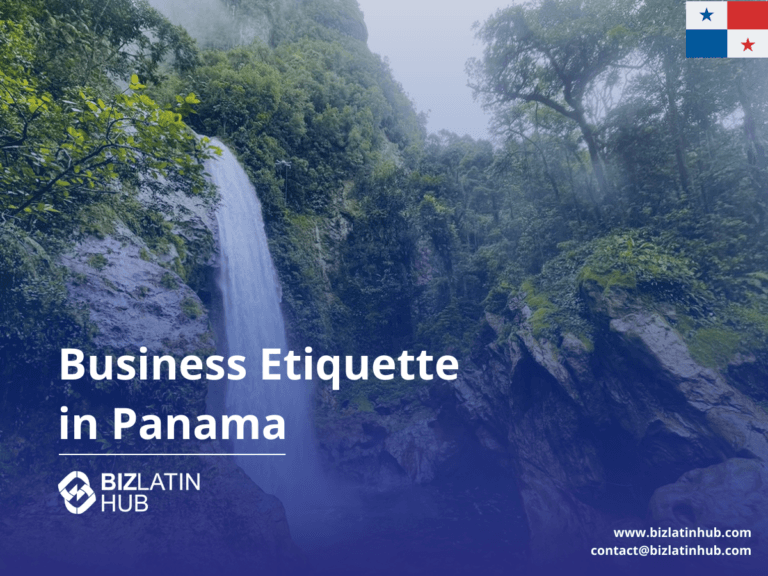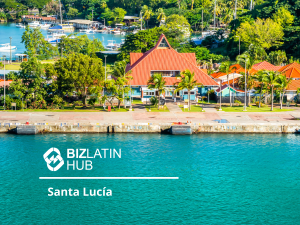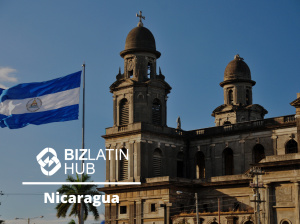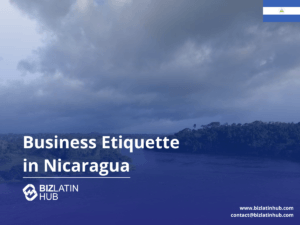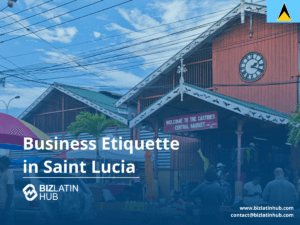Having spent over a decade facilitating international business relationships in Panama, including work with the Panama Canal Authority and major corporations in Panama City’s banking district, I’ve created this comprehensive guide to help you navigate Panamanian business culture and company formation in Panama. Whether you’re preparing for your first business trip or looking to strengthen existing relationships, I’ll share practical insights drawn from real experiences in Panama’s diverse business landscape.
Biz Latin Hub’s operations in Panama City allow us to provide insider guidance on navigating local customs and professional practices.
What is Business Etiquette in Panama?
I’ve observed that business etiquette in Panama represents a sophisticated blend of traditional Latin American values and modern business practices. At its core, it’s about building and maintaining relationships. I’ve seen that business here is inherently personal, where trust and respect form the foundation of every successful venture.
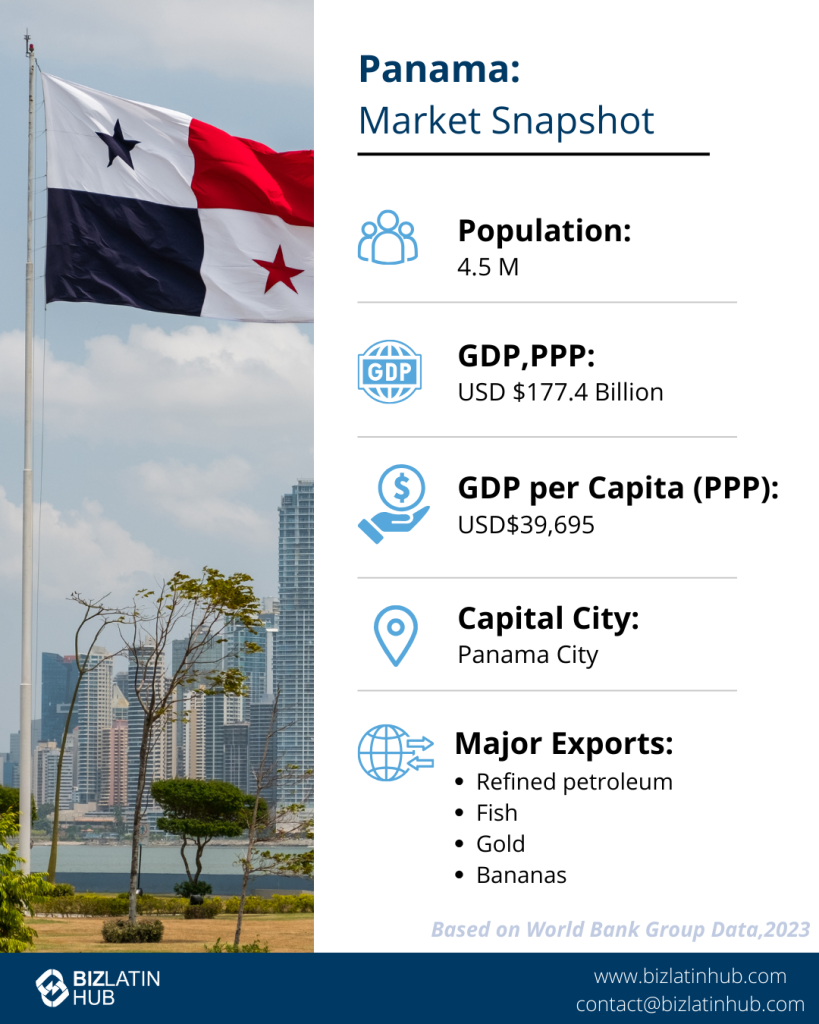
The business landscape varies significantly across Panama’s main commercial hubs. In Panama City’s financial district, home to over 80 international banks, I’ve witnessed how formal etiquette can make or break million-dollar deals. In contrast, when working in the Colón Free Trade Zone, I’ve noticed business moves at a faster pace, though relationships remain crucial. In regional centers like David, Chiriquí, where agricultural business dominates, traditions run deeper, and family connections carry significant weight.
Common Cultural Misunderstandings to Avoid
Through my years of consulting, I’ve seen several recurring mistakes that can damage business relationships:
- Rushing through personal conversations to get to business matters
- Using first names without being invited to do so
- Scheduling meetings during traditional lunch hours (1:00 PM – 3:00 PM)
- Showing impatience with the decision-making process
- Being inflexible with meeting times and locations
Importance of Business Etiquette in Panama
Through my years of experience, I’ve come to understand why mastering Panamanian business etiquette is essential for success. First and foremost, it demonstrates cultural integration. When you show genuine respect for local customs and demonstrate a commitment to building long-term relationships, you open doors that might otherwise remain closed. I’ve seen how this approach enables effective cross-cultural communication and builds trust.
Let me share a recent example: During a meeting between a European tech company and a Panamanian financial institution, I watched two contrasting approaches play out. The company that took time for personal conversation and used proper titles secured a follow-up meeting, while another firm that jumped straight into their presentation left empty-handed.
Understanding Time and Scheduling
One aspect of Panamanian business culture that often surprises foreigners is the flexible approach to time. I’ve learned that:
- Morning meetings (before 10:00 AM) are often the most productive
- Lunch meetings can extend for two hours or more
- Friday afternoons are typically reserved for social interactions
- Important decisions rarely happen in late afternoon meetings
Professional success in Panama is deeply intertwined with cultural understanding. I’ve witnessed how creating valuable business opportunities often stems from preventing cultural misunderstandings and strengthening professional networks. This cultural awareness invariably leads to improved negotiation outcomes and stronger business relationships.
Initial Greetings in Panama
From my experience, first impressions carry significant weight in Panamanian business culture. The greeting process is an art form that deserves careful attention. When meeting someone for the first time, I always start with the appropriate greeting based on the time of day – “Buenos días,” “Buenas tardes,” or “Buenas noches.” These simple phrases set the tone for the interaction that follows.
Initial greetings are formal. A firm handshake, eye contact, and use of professional titles such as ‘Licenciado’ or ‘Ingeniero’ are customary. In corporate settings, always stand to greet someone and maintain polite body language throughout the conversation.
Essential Spanish Phrases for Business
I’ve found these phrases particularly useful in business settings:
- “Mucho gusto” – Pleased to meet you
- “Con permiso” – Excuse me
- “Gracias por su tiempo” – Thank you for your time
- “¿Me permite?” – May I?
- “Hasta pronto” – See you soon
Physical contact plays an important role in Panamanian business greetings. For men, a firm handshake is standard, while women in social business settings might exchange a light cheek kiss. Throughout these interactions, I’ve learned the importance of maintaining eye contact to demonstrate sincerity and engagement.
What I find crucial about initial meetings is the timing. I always allow for extended greetings and engage in personal conversation before moving to business matters. I’ve learned that rushing to discuss business can be perceived as rude or overly aggressive. Just last month, I observed a successful negotiation where taking time for coffee and personal conversation at a local café led to a significant partnership agreement.
Dress Code and Presentation
Appearances are taken seriously, particularly in finance, legal, and multinational settings. The tropical climate doesn’t excuse casual dress in business settings. Panama’s humid climate doesn’t reduce expectations for formal dress. Lightweight suits and polished shoes are standard for men. Women should wear modest, professional attire—light fabrics are fine, but presentation must remain formal. I’ve observed these standards consistently:
For Men:
- Light-weight suits in dark colors
- Long-sleeve shirts, even in summer
- Conservative ties
- Well-polished dress shoes
For Women:
- Business suits or conservative dresses
- Closed-toe shoes
- Minimal jewelry
- Professional makeup
Use of formal titles and surnames
I’ve learned that professional titles hold particular importance in Panamanian business culture. The use of titles isn’t just about formality – it’s about showing respect and understanding of social hierarchy. When addressing someone, I always start with formal titles like Señor, Señora, or Señorita, followed by their surname. For those with professional qualifications, I make sure to use titles like Doctor, Licenciado, or Ingeniero.
My experience has taught me to maintain this formality until explicitly invited to use first names. I’ve found that this approach demonstrates respect and cultural awareness, particularly in group settings. It’s always better to err on the side of formality than to appear too casual too soon.
Firm handshakes and eye contact
Through my interactions in Panama, I’ve come to appreciate the subtleties of physical greetings. A handshake here isn’t just a handshake – it’s a communication tool. I’ve learned to offer a firm but measured grip, holding it slightly longer than what might be common in Western business settings. The handshake often comes with steady eye contact, and sometimes both hands are used to convey additional warmth and sincerity.
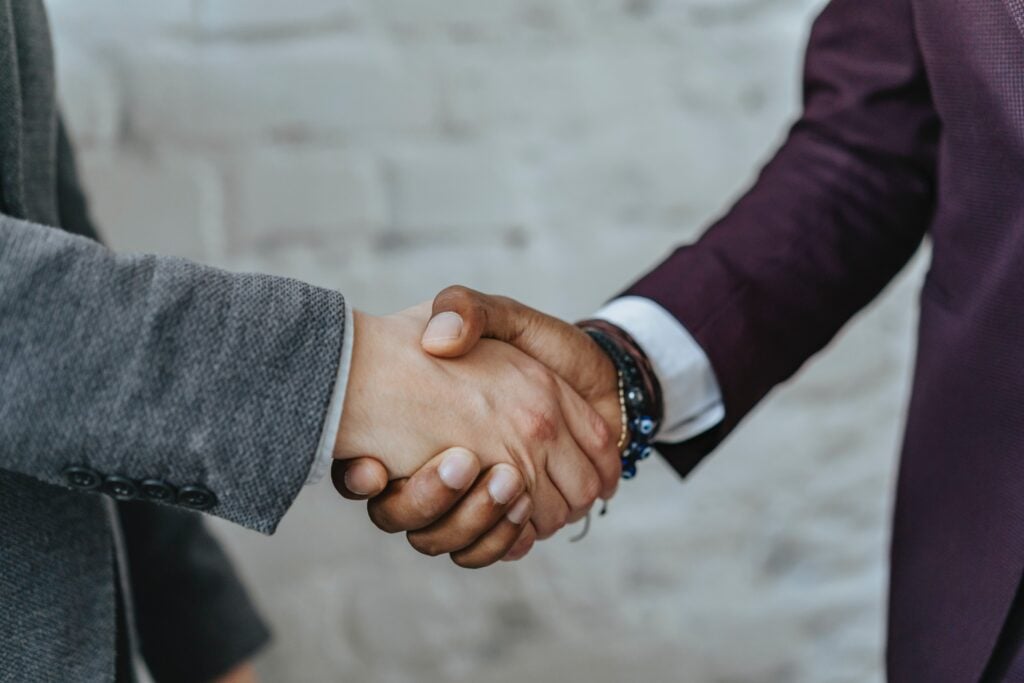
Eye contact during these interactions follows its own set of unwritten rules. I maintain consistent eye contact during conversations to show engagement, but I’m careful not to stare. It’s about finding the right balance – enough to show attention and respect, but not so much as to make others uncomfortable.
Building Professional Relationships
In my experience, successful business relationships in Panama are built on a foundation of personal connection. I’ve found that regular in-person meetings are invaluable, as is showing genuine interest in others’ well-being. Participating in social activities often proves just as important as formal business meetings.
Trust development is another crucial aspect I’ve observed. This comes through consistent communication, reliable follow-through, and demonstrating long-term commitment. What I’ve noticed is that Panamanians value relationships that show mutual respect and understanding over time.
Trust and personal rapport are essential. Business often starts slowly and builds over multiple meetings or social encounters. Coffee meetings, lunches, and follow-up conversations are common steps before any decisions are made. Connections and recommendations from mutual contacts are often the gateway to serious discussions.
It’s common to be invited to lunch as part of the business development process. These are typically formal but friendly settings where business may not be discussed until later in the meal. If invited to a Panamanian home, bring a small gift such as wine or chocolates. Avoid discussing work unless initiated by the host.
Modern Communication Practices
The post-pandemic era has introduced new dynamics to Panama’s business culture. While WhatsApp is now commonly used for business communications (as of 2025), traditional respect for hierarchy remains unchanged. I maintain professional email etiquette while embracing digital platforms, finding that timely responses and maintaining a formal written style are essential, regardless of the medium.
While many professionals speak English—particularly in logistics, finance, and law—Spanish remains the dominant language of business. Communications should be respectful, with indirect phrasing used in early negotiations. Saying ‘we will consider it’ may imply a polite decline; avoid interpreting initial responses at face value.
Digital Communication Guidelines
Based on my recent experiences:
- Email: Use formal language and proper titles
- WhatsApp: Quick responses expected during business hours
- Video calls: Dress professionally, even from home
- Social media: Maintain professional boundaries
For formal communications, email remains primary for official documents, while LinkedIn serves well for professional networking and initial contacts. Virtual meetings typically take place on Zoom, especially with international partners. For daily business communications, WhatsApp Business has become indispensable for quick updates and coordination.
Gift-Giving Protocol
When it comes to gift-giving in Panama, I’ve learned that thoughtfulness matters more than monetary value. I’ve found that quality office accessories or items that represent your home country often make appropriate gifts. The key is selecting items that show consideration while remaining professionally appropriate.
Appropriate Gift Occasions
From my experience, these moments are particularly suitable for gift-giving:
- Year-end holidays
- Company anniversaries
- Completion of major projects
- First meetings at someone’s office
- Reciprocating a received gift
Timing these gifts is important too. While initial meetings might not call for gifts, I’ve found that holiday seasons, special achievements, and business milestones present perfect opportunities for gift-giving. When selecting a gift, I always consider cultural sensitivities and ensure the presentation is professional and discrete.
Decision-Making Process
Understanding the Panamanian decision-making process is crucial for success. I’ve observed that decisions are often made within a hierarchical structure, with senior executives holding significant decision-making power. Consultation with multiple stakeholders is common, and the process can be lengthy.
What I’ve found important is respecting this process and avoiding direct confrontation. Indirect communication styles are often preferred, and it’s essential to be patient and flexible. By understanding and adapting to these cultural nuances, I’ve found that business interactions can be both successful and rewarding.
Putting it all together
Mastering Panamanian business etiquette is essential for successful business operations in this dynamic market. Through my years of experience, I’ve seen how understanding and implementing proper etiquette can transform business relationships from merely transactional to truly collaborative partnerships.
For those new to the Panamanian business environment, I recommend starting with these key practices:
- Research your counterparts’ professional backgrounds and titles before meetings
- Practice proper pronunciation of Spanish greetings and common phrases
- Prepare topics for small talk that demonstrate your interest in Panamanian culture
- Allow extra time in your schedule for relationship-building activities
- Consider bringing appropriate gifts that reflect your home country’s culture
Remember, success in Panama’s business environment comes from viewing etiquette not as a set of rules to follow, but as a way to build genuine, lasting relationships. Start implementing these practices gradually, and you’ll see the positive impact on your business interactions.
For additional guidance, consider connecting with the Panama Chamber of Commerce or local business consultants who can provide more specific insights for your industry. Regular participation in business networking events can also help you build valuable connections while practicing these cultural protocols.
FAQs on Business Etiquette in Panama
Spanish is the official and most widely used business language. Many professionals, especially those working in banking, real estate, or multinational firms, also speak English. Using basic Spanish greetings demonstrates cultural awareness and respect.
Very important. Business relationships develop over time and are built on mutual respect and trust. Expect to have several informal meetings, coffee chats, or meals before formal negotiations begin.
Despite the tropical weather, formal business attire is the standard. Men should wear suits (lightweight if necessary) and women should dress in conservative, polished clothing suitable for high-level meetings.
Yes. While slight delays are tolerated in social settings, punctuality in business is expected—especially from foreign professionals. Always confirm meetings in advance and arrive prepared.
Yes. Address professionals using their appropriate titles, such as ‘Licenciado’ (university graduate), ‘Doctor’, or ‘Ingeniero’, particularly during introductions or formal correspondence.
Yes. Business meals are frequently used to build rapport. These occasions are as much about getting to know the person as they are about discussing deals. Wait for the host to initiate business talk.
Services from Biz Latin Hub Panama
Biz Latin Hub helps you enter the Panamanian market with a full range of back-office solutions. Our team handles your company formation, accounting, visa processing, and legal compliance while making sure you’re following local business customs. From setting up a corporation to managing your monthly tax requirements, we take care of the technical details so you can focus on building relationships with your Panamanian business partners.
Our local legal and accounting teams work together to keep your business running smoothly in Panama. We offer company incorporation, recruitment, payroll management, and contract support – all with a deep understanding of how business really works here. Let us handle your back-office needs while you grow your business in Panama. Click here to get started.

